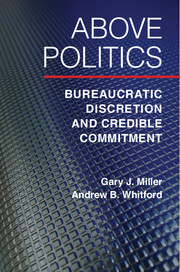Book contents
- Frontmatter
- Contents
- Preface
- Acknowledgments
- 1 Introduction
- 2 The Moral Hazard of Bureaucrats and Politicians
- 3 Political Moral Hazard and Credible Commitment
- 4 Political Moral Hazard and Bureaucratic Autonomy
- 5 “Above Politics”: The Separation of Powers and Bureaucratic Autonomy
- 6 The Control Paradox, Trust, and Leadership
- 7 Professionalism and Credible Commitment
- 8 The Politicization of Financial Regulation
- 9 The Financial Crisis and Reregulation
- 10 Conclusion: The Unraveling of Dodd-Frank
- Works Cited
- Index
- Other books in the series (Series List Continued from page ii)
7 - Professionalism and Credible Commitment
Published online by Cambridge University Press: 05 May 2016
- Frontmatter
- Contents
- Preface
- Acknowledgments
- 1 Introduction
- 2 The Moral Hazard of Bureaucrats and Politicians
- 3 Political Moral Hazard and Credible Commitment
- 4 Political Moral Hazard and Bureaucratic Autonomy
- 5 “Above Politics”: The Separation of Powers and Bureaucratic Autonomy
- 6 The Control Paradox, Trust, and Leadership
- 7 Professionalism and Credible Commitment
- 8 The Politicization of Financial Regulation
- 9 The Financial Crisis and Reregulation
- 10 Conclusion: The Unraveling of Dodd-Frank
- Works Cited
- Index
- Other books in the series (Series List Continued from page ii)
Summary
Professionals are difficult to control, but their behavior is fairly easy to predict. And that, of course, is at the heart of all this. A professional, if given total autonomy and insulated from external pressures, can be counted upon to behave in a manner characteristic of his type. That is what true professionalism is all about. This very predictability ensures business and labor that their mutual interests in stability, clarity, and expertise will be protected.
– Moe (1987, 259)LAWYERS VERSUS ECONOMISTS
In 1969, the United States initiated a lawsuit against IBM, charging that its dominance of the mainframe computer industry made it a monopoly. The government wanted IBM to break itself into several smaller companies. IBM hired 200 lawyers to defend against the lawsuit, which lasted for 13 years (Konrad, 2000).
The Antitrust Division of the Department of Justice (DOJ), which had historically taken a strong position against monopoly, brought the government's suit. Part of the reason for the division's animosity toward monopoly was that it was an agency that was then dominated by lawyers, and their strong professional ties defined its priorities (Weaver, 1977, 1980). Acting as lawyers, they read the Clayton Antitrust Act (1913) as demanding action of this sort. But the position of the Antitrust Division regarding appropriate and inappropriate behavior began to change shortly after the suit was filed. The change was linked to a new infusion of economists into the division, who brought with them a different interpretation of the antitrust activities of government (Katzmann, 1980). They argued that monopoly as such was not necessarily a harmful structure for some industries.
Economists were very critical of the case against IBM. IBM continued to make innovations in the industry; it only began to lose its edge as the industry itself changed during the 13 long years of the government lawsuit. The shift was from mainframe to personal computers, and the suit against IBM may well have contributed to its increasing inability to compete in the new world of PCs.
Many economists argued (in effect) that the social control costs (e.g., IBM's legal expenses and loss of marketing edge) greatly exceeded the reduction in social disorder costs (the possible extraction of monopoly prices in the computer industry) (Djankov et al., 2003).
- Type
- Chapter
- Information
- Above PoliticsBureaucratic Discretion and Credible Commitment, pp. 141 - 167Publisher: Cambridge University PressPrint publication year: 2016
- 1
- Cited by



